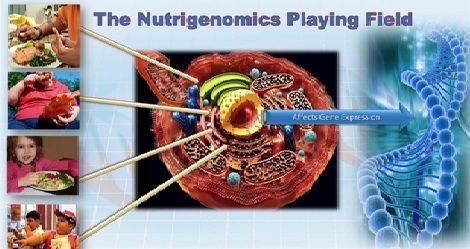‘Nutrigenomics’ – What Does it Mean?
The word, ‘Nutrigenomics’ is derived from ‘Nutri’ meaning food – or nutrition and ‘Gene’, referring to genes. ‘Omics’ refers to the study of something. In short, Nutrigenomics describes the study of the way food interacts with the genes. A simple way of describing this is to say ‘Food talking to your genes’. A more scientific definition would be to say that Nutrigenomics is the study of the effects of foods and food constituents on gene expression.

In practice, Nutrigenomics means this: various molecules found in food eventually find their way into our cells where they interact with molecules called ‘signalling molecules’. These signalling molecules are like switches inside the cell. A health-promoting food would supply molecules which can activate the switches that ‘turn on’ or ‘turn up’ the cell’s ability to make protective compounds. This happens when the cell’s nucleus receives signals to reveal that part of the DNA code that holds the instruction for making protective compounds.
On the other hand, a not-so-healthy food supplies molecules which can activate different signalling molecules inside the cells. These switches have the reverse effect and activating them is likely to result in the production of large quantities of cell-destructive molecules such as those which promote inflammation in the cell.
